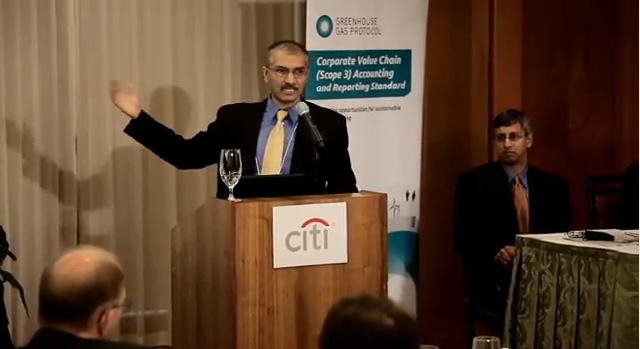Blog
Through Compact of Mayors, 360 Cities Will Cut Their Emissions 17% by 2030
As home to 3.5 billion of the world’s population, cities and urban areas play a crucial role in combating global climate change. And today, many of their leaders are announcing steps to do just that.
New Greenhouse Gas Accounting Tool Will Help China’s Cities Pursue Low-Carbon Development
Low-carbon development has become the core theme of China’s urbanization. In fact, it’s one of the country’s key strategies to achieve its target of reducing carbon intensity by 40-45 percent by 2020.
Pilot a New SWOT Tool for Sustainability
As corporate leaders track and set more ambitious targets for reducing GHG emissions—and take a broader look at Scope 3 emissions—many are looking for a way to find new opportunities to collaborate (internally and externally). Starting this month, WRI is inviting companies to road test a new collaboration tool developed as part of the Next Practice Collaborative.
Launch of the Product Life Cycle and Corporate Value Chain (Scope 3) Accounting and Reporting Standards
On October 4th, 2011 business leaders from around the world will come together to see the new GHG Protocol standards unveiled for the first time. Simultaneous events in New York City and London will be first in a series of launch events around the world. Launch events are already planned for November 18th in Beijing and November 21st in Tokyo. These groundbreaking standards establish the first internationally agreed-upon approaches for measuring and reporting GHG emissions throughout product life cycles and corporate value chains.
New Journal for 2011: Greenhouse Gas Measurement & Management
A new journal, Greenhouse Gas Measurement & Management, focuses on the infrastructure to support future GHG mitigation policies by providing a scholarly forum for both academic researchers and GHG professionals.
Philippine Greenhouse Gas Program Launched in Manila
The Philippines Greenhouse Gas Accounting and Reporting Program (PhilGARP) was officially launched at the Mandarin Oriental Hotel in Manila on November 30, 2006.
New initiative announced to help ICT industry measure carbon footprint
ICT companies and their customers will soon have common approaches and methodologies to calculate the carbon footprints of ICT products and services thanks to industry guidance due to be published at the end of the year.
Launch of The Greenhouse Gas Protocol for the U.S. Public Sector
The Greenhouse Gas Protocol for the U.S. Public Sector was released today by the GHG Protocol Initiative and LMI. The protocol outlines how federal, state and local governments can account for their greenhouse gas (GHG) emissions.
Mexico Bases Climate Change Strategy on GHG Program
The Mexican government has adopted a new national climate change strategy that identifies the GHG Protocol-based Mexico GHG Program as the basis of a step-by-step approach to climate change mitigation.
New EPA Rule Establishes Mandatory Greenhouse Gas Reporting
EPA is creating a nationwide database of greenhouse gas emissions, an important first step on the path to reducing U.S. emissions. The plan would require 13,000 facilities to report their emissions.
Video: Leading Companies Use New Standards to Uncover Greatest Sources of Carbon Emissions
Last week’s Rio+20 conference failed to yield strong sustainability commitments from corporations. The gap between where we need to get to avoid climate change’s worst effects and the actions companies are willing to take to get us there have never been further apart.
New Guidelines on Supply Chain and Lifecycle Greenhouse Gas Accounting and Reporting in Planning Process
Program Based on U.S. EPA's Climate Leaders to be Launched in India
Since its creation in 2002, the U.S. EPA Climate Leaders Program has assisted more than 150 companies to develop and implement long-term climate change strategies. This includes developing a GHG inventory, an inventory management plan, and a GHG reduction target. To replicate the U.S. EPA Climate Leaders Program's successful model in India, WRI, U.S. EPA and the Confederation of Indian Industry (CII) Green Business Center (GBC) are partnering together to replicate the Climate Leaders program there.
LCM 2011, Berlin, Germany
WRI’s GHG Protocol Director, Pankaj Bhatia, delivered a keynote address on the new GHG Protocol Supply Chain Standards at the Life Cycle Management (LCM) Conference 2011. The Life Cycle Management conference series is one of the world’s leading forums for environmental, economic and social sustainability.
Open Comment Period for Agriculture Guidance
GHG Protocol has released a second draft of its Agricultural Guidance for open comment. The Agricultural Guidance is an international supplement to the GHG Protocol Corporate Standard that aims to customize the latter to the agricultural sector, while addressing the unique challenges posed by the sector - accounting for reversible carbon stocks in soils and biomass, setting and tracking progress toward reduction targets against a background of highly variable emissions, quantifying emissions, etc.
Otarian Restaurant in New York City Uses WRI’s Greenhouse Gas Protocol
On the evening of April 14th, WRI filled a role not normally reserved for environmental think tanks: VIP guest at a high-profile New York restaurant opening. Otarian, now open in New York City’s West Village, is a new boutique fast-casual restaurant chain based on the principles of sustainability and vegetarianism. Otarian is also the first global restaurant chain to track the carbon footprint of all of its menu items.
Program Officially Transitions from Pilot Phase to Headquarters at SEMARNAT
The Mexico GHG Program officially transitioned from a pilot project to a permanent program on October 2, marking a significant milestone for the program partners and 30 par
Launch of the GHG Protocol Product Life Cycle and Corporate Value Chain Standards
On October 4th the GHG Protocol launched the new Product Life Cycle and Corporate Value Chain Standards with events in New York City and London. The global press launch of the Standards in New York City occurred in conjunction with WRI’s Corporate Consultative Group (CCG) fall meeting. CCG is a group of 150-200 representatives of large corporations, mainly sustainability managers, who are coming to engage with WRI experts – and with each other – to access environmental intelligence in order to protect and grow shareholder value and steer business to better protect the environment.
LULUCF Performance Standard Approach Met with Enthusiasm at Nairobi Launch
Project developers are concerned that high transaction costs and uncertainty around the acceptance of projects by governing bodies is limiting the number of projects being developed in Africa and around the world.












